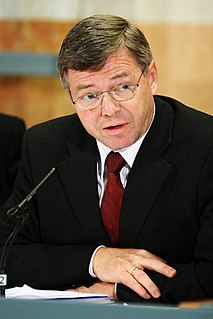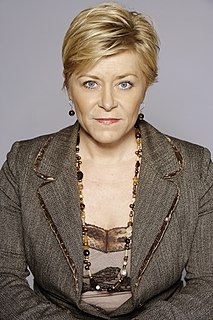Related Research Articles
The Progress Party, commonly abbreviated as FrP, is a right-wing political party in Norway. The FrP has traditionally self-identified as classical-liberal and as a libertarian party but is generally positioned to the right of the Conservative Party, and is considered the most right-wing party to be represented in parliament. It is often described as moderately right-wing populist; this characterization has also been disputed in both academic and public discourse. By 2020, the party attained a growing national conservative faction. After the 2017 parliamentary election, it was Norway's third largest political party, with 26 representatives in the Storting. It was a partner in the government coalition led by the Conservative Party from 2013 to 2020.

Kjell Magne Bondevik is a Norwegian Lutheran minister and politician. As leader of the Christian Democratic Party, he served as the 33rd prime minister of Norway from 1997 to 2000, and from 2001 to 2005, making him, after incumbent Erna Solberg, Norway's longest serving non-Labour Party prime minister since World War II. Currently, Bondevik is president of the Oslo Centre for Peace and Human Rights.

Kåre Isaachsen Willoch was a Norwegian politician who served as the 30th prime minister of Norway from 1981 to 1986 and as leader of the Conservative Party from 1970 to 1974. He previously served as the Minister of Trade and Shipping from August to September 1963 and 1965 to 1970, and as the president of the Nordic Council in 1973.

The Christian Democratic Party, is a Christian-democratic political party in Norway founded in 1933. The party is an observer member of the European People's Party (EPP). It currently holds three seats in the Parliament, having won 3.8% of the vote in the 2021 parliamentary election. The current leader of the party is Olaug Bollestad.

The Socialist Left Party, is a democratic socialist political party in Norway. Positioned on the left-wing of the political spectrum, SV is opposed to European Union membership, and supports republicanism in Norway. As of 2018, the party has 11,385 members; the number has steadily increased since a low point in 2015. The party leader is Audun Lysbakken, who was elected on 11 March 2012.
The Conservative Party is a liberal-conservative political party in Norway. It is the major party of the Norwegian centre-right, and was until October 2021 the leading party in government as part of the Solberg cabinet. The current party leader is former Prime Minister Erna Solberg. The party is a member of the International Democrat Union and an associate member of the European People's Party.

The Liberal Party is a centrist political party in Norway. It was founded in 1884 and it is the oldest political party in Norway. Ideologically positioned in the centre, it is a liberal party which has over the time enacted reforms such as parliamentarism, freedom of religion, universal suffrage and state schooling.

The Fatherland Party was a political party in Norway, which was founded by former local Progress Party politician Harald Trefall in 1990. Primarily based in Western Norway, the party supported nationalist positions such as opposition to immigration and the European Union. It got two representatives elected to public office in the 1991 local elections, in a county and municipal council respectively. The party never won representation since, and was dissolved in 2008 after years of electoral inactivity.
The Democrats, formerly and distinctly known as the Democrats in Norway, is a national conservative political party in Norway without parliamentary representation.

Erling Folkvord is a Norwegian politician for the Red party, and a former member of the Parliament of Norway. A revolutionary socialist, he was one of the leading members of the Workers' Communist Party and the Red Electoral Alliance before they merged to form Red. He sat as a member of the Parliament of Norway from 1993 to 1997, becoming the first socialist to the left of the Socialist Left Party and the Labour Party in parliament since 1961. He later lost his position in 1997, and has been a candidate for parliament ever since. He has been a member of the Oslo City Council from 1983 to 1993, and again since 1999. Folkvord has become one of the best-known Norwegian politicians on the left who is not connected with the Labour Party and the Socialist Left Party.
Vidar Sveinung Kleppe is a Norwegian politician. He was a member of parliament and deputy leader of the Progress Party until he was suspended and left the party in 2001. He was the leader of the Democrats party from 2002 to 2012, and has since 2003 held office as a member of the Vest-Agder county council and the Kristiansand municipal council.

Siv Jensen is a Norwegian who served as the leader of the Progress Party from 2006 to 2021. She also held the position as Minister of Finance from 2013 to 2020 in the Solberg Cabinet. She was also a member of the Norwegian parliament from Oslo from 1997 to 2021.

Christian Tybring-Gjedde is a Norwegian politician who represents the Progress Party. He has been a member of the Norwegian parliament since 2005, and was the leader of the Progress Party's Oslo chapter from 2010 to 2014.

The 2009 parliamentary election was held in Norway on 13 and 14 September 2009. Elections in Norway are held on a Monday in September, usually the second or third Monday, as determined by the king. Early voting was possible between 10 August and 11 September 2009, while some municipalities also held open voting on 13 September. Voters elected 169 members for the Storting, each for a four-year term. Voter turn-out in the 2009 general elections was 76.4%.
The New Future Coalition Party was a Norwegian political party, which was founded by Member of Parliament Finn Thoresen in 1993. The party was never successful in elections, and merged with the Christian Conservative Party to form the Christian Unity Party in 1998.
Stop Immigration was a political party in Norway, founded by Jack Erik Kjuus in 1987. The party was never particularly successful, and its only elected representative was in the Drammen city council, in both 1991 and 1995. The party was succeeded by the White Electoral Alliance in 1995.
The National Democrats was a political party in Norway, which was founded in January 1990. The party was led by Hege Søfteland, who had been excluded from Stop Immigration. The party's main issue was to stop what it called the "mass immigration to Norway." It also wanted to stop foreign aid and replace it with a "disaster fund", and was against Norway joining the European Economic Community.
The 1994 national convention of the Progress Party of Norway was held from 15 April to 17 April at the hotel Bolkesjø Turisthotell in Bolkesjø, Telemark. It was originally set up to be a normal convention with 157 delegates in a non-election year, but because of mounting antagonism between a traditionalist and a libertarian faction, it became clear some months before the conventions that personal positions could be at stake. The party leader seat, held by Carl I. Hagen since 1978, was up for re-election. The deputy leaders Ellen Wibe and Hans J. Røsjorde was not up for election until 1995, but there were talks about forming a motion of no confidence against Wibe. The political disagreements roughly corresponded to a cleavage between two factions.

The Christians Party is a conservative Christian political party in Norway founded in 2011. The party leader is Erik Selle.

A parliamentary election was held in Norway on 11 September 2017 to elect all 169 members of the unicameral Norwegian Parliament, the Storting. The non-socialist parties retained a reduced majority of 88 seats, allowing Prime Minister Erna Solberg's Conservative-Progress coalition to remain in government. The Liberal Party joined the coalition in January 2018 but it remained a minority cabinet until the Christian Democratic Party joined the coalition in 2019. The three largest centre-left parties won 79 seats. The Green Party retained its single seat, while the Red Party won its first ever seat.
References
- 1 2 Magnus, Gunnar (11 August 1993). "Små partier store forhåpninger" (in Norwegian). p. 12. Retrieved 6 March 2011.
- ↑ Andreassen, Thorleif (8 February 1993). "Nyttig bok: Det skjedde mye politikken i 1992" (in Norwegian). p. 10. Retrieved 6 March 2011.
- ↑ Thoresen, Kåre (8 September 1981). "Frie Folkevalgte". Aftenposten (in Norwegian). p. 15. Retrieved 6 March 2011.
- 1 2 Avner, Terje (16 February 1984). "Politisk parti ville politi-sjekke medlem". Aftenposten (in Norwegian). p. 16. Retrieved 6 March 2011.
- ↑ "Nytt parti opprettet". Aftenposten (in Norwegian). 28 September 1998. p. 4. Retrieved 6 March 2011.
- 1 2 Bøckman, Knut (18 December 1990). "Parti som protesterer" (in Norwegian). p. 4. Retrieved 6 March 2011.
- ↑ Furuly, Jan Gunnar (30 October 1993). "Høyre-ekstremismen på sterk fremmarsj: Frisk vekst på ytterste fløy" (in Norwegian). p. 5. Retrieved 6 March 2011.